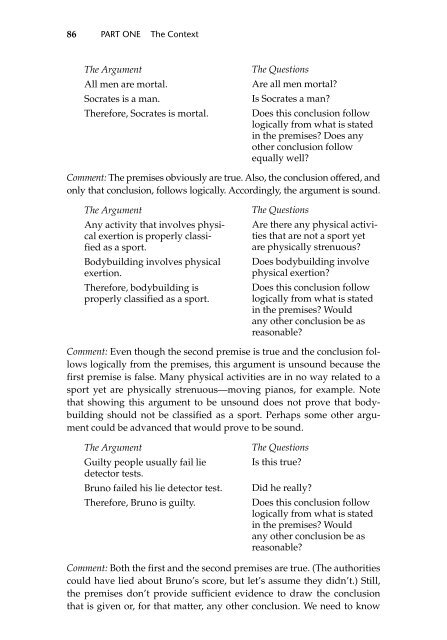Beyond Feelings
Beyond Feelings
Beyond Feelings
You also want an ePaper? Increase the reach of your titles
YUMPU automatically turns print PDFs into web optimized ePapers that Google loves.
86 PART ONE The Context<br />
The Argument<br />
All men are mortal.<br />
Socrates is a man.<br />
Therefore, Socrates is mortal.<br />
The Questions<br />
Are all men mortal?<br />
Is Socrates a man?<br />
Does this conclusion follow<br />
logically from what is stated<br />
in the premises? Does any<br />
other conclusion follow<br />
equally well?<br />
Comment: The premises obviously are true. Also, the conclusion offered, and<br />
only that conclusion, follows logically. Accordingly, the argument is sound.<br />
The Argument<br />
Any activity that involves physical<br />
exertion is properly classified<br />
as a sport.<br />
Bodybuilding involves physical<br />
exertion.<br />
Therefore, bodybuilding is<br />
properly classified as a sport.<br />
The Questions<br />
Are there any physical activities<br />
that are not a sport yet<br />
are physically strenuous?<br />
Does bodybuilding involve<br />
physical exertion?<br />
Does this conclusion follow<br />
logically from what is stated<br />
in the premises? Would<br />
any other conclusion be as<br />
reasonable?<br />
Comment: Even though the second premise is true and the conclusion follows<br />
logically from the premises, this argument is unsound because the<br />
first premise is false. Many physical activities are in no way related to a<br />
sport yet are physically strenuous—moving pianos, for example. Note<br />
that showing this argument to be unsound does not prove that bodybuilding<br />
should not be classified as a sport. Perhaps some other argument<br />
could be advanced that would prove to be sound.<br />
The Argument<br />
Guilty people usually fail lie<br />
detector tests.<br />
Bruno failed his lie detector test.<br />
Therefore, Bruno is guilty.<br />
The Questions<br />
Is this true?<br />
Did he really?<br />
Does this conclusion follow<br />
logically from what is stated<br />
in the premises? Would<br />
any other conclusion be as<br />
reasonable?<br />
Comment: Both the first and the second premises are true. (The authorities<br />
could have lied about Bruno’s score, but let’s assume they didn’t.) Still,<br />
the premises don’t provide sufficient evidence to draw the conclusion<br />
that is given or, for that matter, any other conclusion. We need to know


